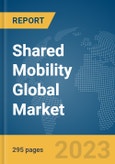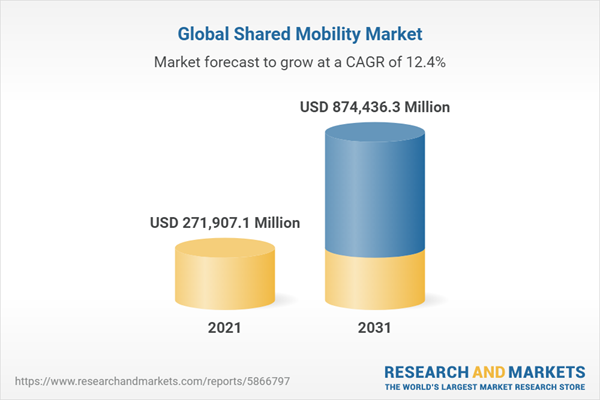The global shared mobility market reached a value of nearly $271,907.1 million in 2022, having increased at a compound annual growth rate (CAGR) of 9.1% since 2017. The market is expected to grow from $271,907.1 million in 2022 to $495,778.6 million in 2027 at a rate of 12.8%. The market is then expected to grow at a CAGR of 12.0% from 2027 and reach $874,436.3 million in 2032.
Growth in the historic period resulted from increased sales of hybrid electric vehicles (HEVS), a surge in urbanization, increased occurrences of vehicle theft, and a lack of parking spaces. Factors that negatively affected growth in the historic period were the COVID-19 impact and the fluctuating prices of raw materials of automobiles.
Going forward, the strict environmental regulations and emission requirements, a rise in demand for ride hailing and ride sharing services, and an increase in fuel prices will drive the market. Factors that could hinder the growth of the shared mobility market in the future include the Russia-Ukraine war impact and the rising interest rates.
The shared mobility market is segmented by service into ride hailing, bike sharing, ride sharing, car sharing, and other services. The ride hailing market was the largest segment of the shared mobility market by service, accounting for $124,491.2 million or 45.8% of the total market in 2022. The bike sharing market is expected to be the fastest-growing segment going forward at a CAGR of 13.8%.
The shared mobility market is segmented by mobility vehicle into cars, two-wheelers, and other mobility vehicles. The cars market was the largest segment of the shared mobility market by mobility vehicle, accounting for $203,692.9 million or 74.9% of the total market in 2022. The two-wheelers market is expected to be the fastest-growing segment going forward at a CAGR of 16.4%.
The shared mobility market is segmented by business model into P2P (peer-to-peer), B2B (business-to-business), and B2C (business-to-customer). The B2C market was the largest segment of the shared mobility market by business model, accounting for $151,340.5 million or 55.7% of the total market in 2022. The B2B market is expected to be the fastest-growing segment going forward at a CAGR of 12.6%.
Asia-Pacific was the largest region in the shared mobility market, accounting for 39.2% of the global market in 2022. It was followed by North America, Western Europe, and other regions. Going forward, the fastest growing regions in the shared mobility market will be the Asia-Pacific and the Middle East, where growth will be at CAGRs of 14.8% and 13.8% respectively from 2022-2027.
The global shared mobility market is highly fragmented, with a large number of players operating in the market. The top ten competitors in the market made up to 11.30% of the total market in 2021. Didi Chuxing Technology Co was the largest competitor with a 5.69% share of the market, followed by Uber Technologies Inc. with 2.71%, Avis Budget Group with 1.41%, Lyft, Inc. with 0.49%, The Hertz Corporation with 0.47%, Grab Taxi Holdings Pvt. Ltd. with 0.20%, Deutsche Bahn Connect GmbH with 0.15%, BlaBlaCar with 0.09%, Gett Inc with 0.06%, and ANI Technologies Private Limited with 0.06%.
The top opportunities in the shared mobility market by service will arise in the ride hailing market, which will gain $102,511.2 million of global annual sales by 2027. The top opportunities in the shared mobility market by mobility vehicle will arise in the cars market, which will gain $149,971.0 million of global annual sales by 2027. The top opportunities in the shared mobility market by business model will arise in the B2C market, which will gain $122,013.2 million of global annual sales by 2027. The shared mobility market size will gain the most in China at $61,374.5 million.
Market-trend-based strategies for the shared mobility market include a focus on innovative vehicle fleet-sharing platforms, the adoption of autonomous vehicle technology, technology advancements, upgrading of mobility sharing apps, and strategic partnerships and collaborations.
Player-adopted strategies in the shared mobility industry include a focus on gaining experience in shared mobility services and cutting-edge technology through the strategic introduction of new vehicles, a focus on advancing technology to improve the customer experience through strategic partnerships, a focus on expanding the micro mobility market through strategic partnerships, and a focus on expanding the business through strategic partnerships.
To take advantage of the opportunities, the publisher recommends the shared mobility companies to, focus on innovative vehicle fleet-sharing platforms, focus on autonomous vehicle technology, focus on technology advancements, focus on mobile applications, continue to focus on fast-growing services, expand in emerging markets, continue to focus on developed markets, focus on partnerships and collaborations, provide competitively priced offerings, dynamic pricing, participate in trade shows and events, target consumers through digital channels, focus on digital native population, and focus on the urban population.
Table of Contents
Executive Summary
Shared Mobility Global Market Opportunities and Strategies To 2032 provides the strategists; marketers and senior management with the critical information they need to assess the global shared mobility market as it emerges from the COVID-19 shut down.Reasons to Purchase
- Gain a truly global perspective with the most comprehensive report available on this market covering 12 geographies.
- Understand how the market is being affected by the coronavirus and how it is likely to emerge and grow as the impact of the virus abates.
- Create regional and country strategies on the basis of local data and analysis.
- Identify growth segments for investment.
- Outperform competitors using forecast data and the drivers and trends shaping the market.
- Understand customers based on the latest market research findings.
- Benchmark performance against key competitors.
- Utilize the relationships between key data sets for superior strategizing.
- Suitable for supporting your internal and external presentations with reliable high-quality data and analysis
Description:Where is the largest and fastest growing market for shared mobility? How does the market relate to the overall economy; demography and other similar markets? What forces will shape the market going forward? The shared mobility market global report answers all these questions and many more.
The report covers market characteristics; size and growth; segmentation; regional and country breakdowns; competitive landscape; market shares; trends and strategies for this market. It traces the market's historic and forecast market growth by geography. It places the market within the context of the wider shared mobility market; and compares it with other markets.
The report covers the following chapters:
- Introduction and Market Characteristics - Brief introduction to the segmentations covered in the market, definitions and explanations about the shared mobility market.
- Key Trends - Highlights the major trends shaping the global shared mobility market. This section also highlights likely future developments in the market.
- Global Market Size and Growth - Global historic (2017-2022) and forecast (2022-2027), and (2027-2032) market values, and drivers and restraints that support and control the growth of the market in the historic and forecast periods.
- Regional Analysis - Historic (2017-2022) and forecast (2022-2027), and (2027-2032) market values and growth and market share comparison by region.
- Market Segmentation - Contains the market values (2017-2032) and analysis for each segment by service, by mobility vehicle, and by business model in the market.
- Regional Market Size and Growth - Regional market size (2022), historic (2017-2022) and forecast (2022-2027), and (2027-2032) market values, and growth and market share comparison of countries within the region. This report includes information on all the regions Asia-Pacific, Western Europe, Eastern Europe, North America, South America, Middle East and Africa and major countries within each region.
- Competitive Landscape - Details on the competitive landscape of the market, estimated market shares and company profiles of the leading players.
- Key Mergers and Acquisitions - Information on recent mergers and acquisitions in the market covered in the report. This section gives key financial details of mergers and acquisitions, which have shaped the market in recent years.
- Market Opportunities and Strategies - Describes market opportunities and strategies based on findings of the research, with information on growth opportunities across countries, segments and strategies to be followed in those markets.
- Conclusions and Recommendations - This section includes recommendations for shared mobility providers in terms of product/service offerings geographic expansion, marketing strategies and target groups.
- Appendix - This section includes details on the NAICS codes covered, abbreviations and currencies codes used in this report.
Scope:
- Introduction and Market Characteristics - Brief introduction to the segmentations covered in the market, definitions and explanations about the shared mobility market.
- Key Trends - Highlights the major trends shaping the global shared mobility market. This section also highlights likely future developments in the market.
- Global Market Size and Growth - Global historic (2017-2022) and forecast (2022-2027), and (2027-2032) market values, and drivers and restraints that support and control the growth of the market in the historic and forecast periods.
- Regional Analysis - Historic (2017-2022) and forecast (2022-2027), and (2027-2032) market values and growth and market share comparison by region.
- Market Segmentation - Contains the market values (2017-2032) and analysis for each segment by service, by mobility vehicle, and by business model in the market.
- Regional Market Size and Growth - Regional market size (2022), historic (2017-2022) and forecast (2022-2027), and (2027-2032) market values, and growth and market share comparison of countries within the region. This report includes information on all the regions Asia-Pacific, Western Europe, Eastern Europe, North America, South America, Middle East and Africa and major countries within each region.
- Competitive Landscape - Details on the competitive landscape of the market, estimated market shares and company profiles of the leading players.
- Key Mergers and Acquisitions - Information on recent mergers and acquisitions in the market covered in the report. This section gives key financial details of mergers and acquisitions, which have shaped the market in recent years.
- Market Opportunities and Strategies - Describes market opportunities and strategies based on findings of the research, with information on growth opportunities across countries, segments and strategies to be followed in those markets.
- Conclusions and Recommendations - This section includes recommendations for shared mobility providers in terms of product/service offerings geographic expansion, marketing strategies and target groups.
- Appendix - This section includes details on the NAICS codes covered, abbreviations and currencies codes used in this report.
Scope:
Markets Covered:
1) By Service: Ride Hailing; Bike Sharing; Ride Sharing; Car Sharing; Other Services2) By Mobility Vehicle: Cars; Two-Wheelers; Other Mobility Vehicles
3) By Business Model: P2P (Peer-To-Peer); B2B (Business-To-Business); B2C (Business-To-Customer)
Companies Mentioned: Didi Chuxing Technology Co; Uber Technologies Inc; Avis Budget Group; Lyft, Inc; The Hertz Corporation
Countries: China; Australia; India; Indonesia; Japan; South Korea; USA; Brazil; France; Germany; UK; Russia
Regions: Asia-Pacific; Western Europe; Eastern Europe; North America; South America; Middle East; Africa
Time series: Five years historic and ten years forecast.
Data: Ratios of market size and growth to related markets; GDP proportions; expenditure per capita; shared mobility indicators comparison.
Data segmentations: country and regional historic and forecast data; market share of competitors; market segments.
Sourcing and Referencing: Data and analysis throughout the report is sourced using end notes.
Companies Mentioned
- Didi Chuxing Technology Co
- Uber Technologies Inc
- Avis Budget Group
- Lyft, Inc
- The Hertz Corporation
Table Information
| Report Attribute | Details |
|---|---|
| No. of Pages | 295 |
| Published | August 2023 |
| Forecast Period | 2021 - 2031 |
| Estimated Market Value ( USD | $ 271907.1 Million |
| Forecasted Market Value ( USD | $ 874436.3 Million |
| Compound Annual Growth Rate | 12.4% |
| Regions Covered | Global |
| No. of Companies Mentioned | 5 |









